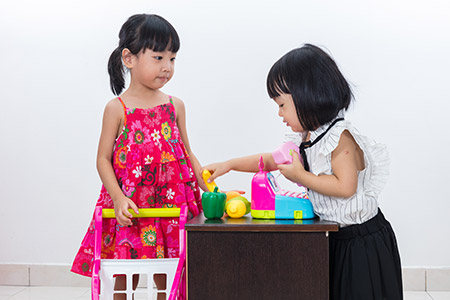Stages of Play Development
Solitary Play
In this stage, infants and toddlers explore things in their environment on their own. They mouth objects, dump things in and out. They may be aware of others, but pretty much "play" on their own.
Parallel Play
Toddlers and preschoolers sometimes play "beside" each other. They might not be ready to share their play or play together. Rather, they play next to others, and may watch what is going on around them.
Associative Play
This is observed in some 3-4 year olds. They begin some loosely organized "together" play, but they may not be cooperating to follow a joint plan to build something or act out an event.
Cooperative Play
This is a highly social type of play. 4-5 year olds may assign roles and act out familiar events (e.g., "you be the pet store owner, and I will be the shopper" or "you be the doctor, and I will have a broken leg"). They often plan together, and think about what toys and props they need. They share ideas and communication.

Play Milestones
Infants
When your baby is very small, toys and objects are things to touch and taste and grab and hold.
3-6 Months
Your baby will recognize favorite toys, and will begin to reach for them. Pretty soon, toys with large parts that move or bend or make noise become fascinating.
7-10 Months
Your baby is playing with toys in special ways: pulling, stacking, and pushing them back and forth with you.
10-12 Months
Sorting toys with holes of different shapes (ring stackers, shape boxes), big single shape puzzles, and balls that roll away from you and come back are all a lot of fun.
Toddlers
Toddlers learn from toys that look like real objects, like toy doctor kits, dishes, and plastic work tables, will let your child copy the actions he sees in the world.
Preschoolers
Tots and preschoolers begin to make up sequences of actions: building a house, taking care of a doll, cooking a meal, putting out a fire, or planting a garden. Later as children begin to play together, the language of play will be very important. Children tell each other what they are doing and what roles they will play in their creative world of pretending.
Encourage Language during Play
Early in the development of play you will want to provide and encourage the language that will be needed later. Have fun! Play is meant to be enjoyed, and it is a great opportunity for language learning.
Talk about Things that Interest Your Baby
If your
baby shows interest in something – talk about it! Provide names for things your child reaches for, touches or explores.
Talk about the Actions Your Baby is Taking
When your baby can walk there are places to go and lots of language about getting there. Babies who start walking are interested in movement. Talk about what they are doing and where they're headed. You can also point out the uh-ohs for the spills he takes.